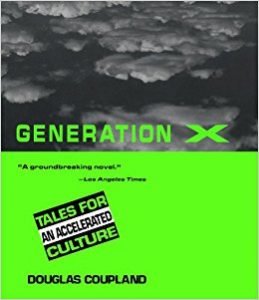
I have a confession to make. When I took my first crack at Douglas Coupland’s Generation X: Tales for an Accelerated Culture, I didn’t get very far.
It was a suggested read from a friend, so I bought it. I read 35 pages and then, for some reason, never finished the book. Fast forward to this year: I read Microserfs, also by Douglas Coupland, and ended up falling in love with his writing style.
A few days later, while going through what to read next, I decided to add Generation X back onto the reading list.
Now, as I have finally completed the reading of Generation X, it occurs to me that I was too young to really “get it.” Sure, I hung out with the Gen Xers when I was young, but this novel is as much about losing youth as it is about anything else.
In my 20’s, I was still feeling quite youthful. However, now in my mid-30’s, this book speaks to me in volumes. And it also reminds me why I ran with the older crowd and those who actually are Gen X.

Author Douglas Coupland
This was the generation that drove out the music of the 80s and gave rise to grunge (and also later destroyed grunge for a new wave of punk and rock), a generation born of MTV and the dissidence of the boomers. It was a generation that I feel a part of, yet not because my age sequesters me to look up to Gen X and down on millennials while being a generation in between. That prize belongs to neither.
And being of that in-between – a generation who grew up analog to experience a semi-digital adolescence and digital adulthood, that oft written about generation called Xennials or The Oregon Trail generation who yearned to be Gen Xers because of their music and their movies and their savoir-faire – I feel like this book is meant for me at this very time.
This book, speaks volumes about how far we really haven’t come. I don’t mean to speak for my generation, but a book as seminal to Gen X as Generation X is, makes me believe that my in-between generation is more Gen X Light than anything else.
So what is this book? “Andy, Dag, and Claire are underemployed, overeducated, intensely private, and unpredictable. Like the group they mirror, they have nowhere to direct their anger, no one to assuage their fears, and no culture to replace their anomie.”
And from the vantages of Andy’s first-person voice, and the stories told by Dag, Claire, and other ancillary characters, Coupland takes every opportunity to explain that the “disenfranchised youth,” so often used as a description of Gen X, are not lazy so much as they are just a different generation altogether. They carry very dissimilar ideas and values that seem to have their ambitions misplaced on the battlefield against the generations who came before because they’ve been battling simply to be understood. But then again… Aren’t we all?
Regardless of generation, the differences between each subsequent generation since the Boomers has been as different as the technology that they inherited in their adolescence. I’m not blaming technology, nor the prior generations, I’m just using that a metaphor that as technology has rapidly grown, so have the differences between each subsequent generation. It could be a cause and effect, but I’m not really here to debate that.

Generation X: Tales for an Accelerated Culture by Douglas Coupland
There’s a lot in Generation X, like the Gen Xers it is based upon, fictional as they may be, that still resonates with those of us who came since, and I’m talking about anyone who has come since. The battles Generation X fought to gain their own ideals and their own place within the world are still battles going on today.
I’m fighting not to be a millennial, of which I am statistically not. Millennials are fighting to – well, I don’t know what they’re fighting for. Maybe it has to do with Pokemon, texting without vowels, or being snowflakes. Ok, that was harsh, but they’ll either fight back or move on, or they’ll fight back and then move on, which is what I learned both from the book Generation X and from the friends I have from that generation.
At this point in time, if you’re over the age of 30, read this book. I don’t care how much of an “old soul” you are, I’m just not sure at this point in time that anyone in their 20’s will get it. In fact, that’s how I started this whole thing, and I didn’t get it then either.
This book has the most impact when you’ve got some perspective of youth. Otherwise, you’re probably in your youth, and I’m sorry, but those youngins don’t really have any perspective on their youth while they’re in it. Hindsight is a blessing, and it’s almost always in 20/20 vision.
So, if you are of the suggested age, which again is all about perspective, then I urge you to pick up Generation X by Douglas Coupland. You won’t be sorry you did.